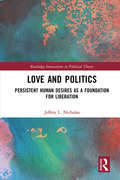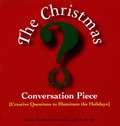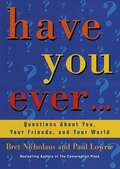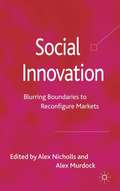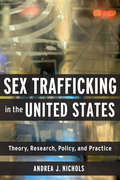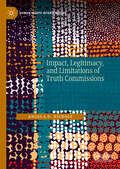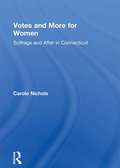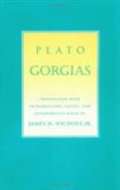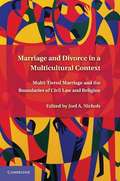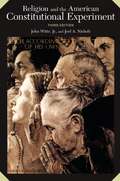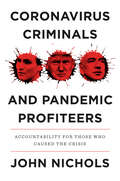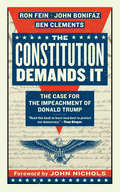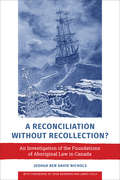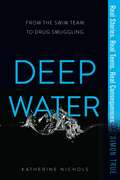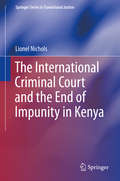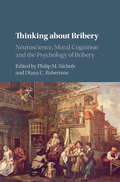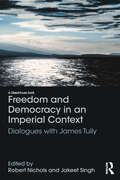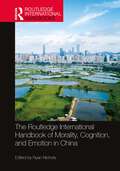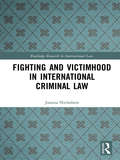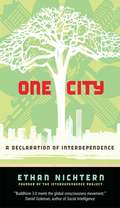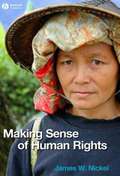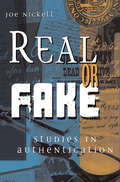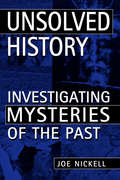- Table View
- List View
Love and Politics: Persistent Human Desires as a Foundation for Liberation (Routledge Innovations in Political Theory)
by Jeffery L. NicholasIn, Love and Politics Jeffery L. Nicholas argues that Eros is the final rejection of an alienated life, in which humans are prevented from developing their human powers; Eros, in contrast, is an overflowing of acting into new realities and new beauties, a world in which human beings extend their powers and senses. Nicholas uniquely interprets Alasdair MacIntyre’s Revolutionary Aristotelianism as a response to alienation defined as the divorce of fact from value. However, this account cannot address alienation in the form of the oppression of women or people of color. Importantly, it fails to acknowledge the domination of nature that blackens the heart of alienated life. Alienation must be seen as a separation of the human from nature. Nicholas turns to Aristotle, first, to uncover the way his philosophy embodies a divorce of human from nature, then to reconstruct the essential elements of Aristotle’s metaphysics to defend a philosophical anthropology based on Eros. Love and Politics: Persistent Human Desires as a Foundation for Liberation presents a critical theory that synthesizes MacIntyre’s Revolutionary Aristotelianism, Frankfurt School Critical Theory, and Social Reproduction Theory. It will be of great interest to political theorists and philosophers.
Christmas Conversation Piece
by Bret Nicholaus Paul LowrieWhat one Christmas tradition would you never want to give up? If you could spend Christmas anywhere in the world, where would you most want to be? If you could have visited the Christ child just as the Three Kings did, what would you have brought as a gift? You've been chosen to host a sensational Christmas celebration on TV: What three guests would you choose to make it the best Christmas special ever? The Christmas Conversation Pieceoffers these and many other questions to pose and ponder during a season of both deep reflection and unabashed merriment. This charming volume--the perfect stocking stuffer--will provide you, your family, and your friends with twelve days of surprising and amusing Yuletide questions. Who would you most like to meet under the mistletoe? Your answer just may change by Christmas Eve!
Have You Ever...: Questions About You, Your Friends, and Your World
by Bret Nicholaus Paul LowrieHave you ever met a professional musician? Have you ever flown in something other than an airplane? Have you ever blown a tire while driving? Have you ever gone on a blind date? Have you ever dreamed in color? Masters of fun and friendly communication, Bret Nicholaus and Paul Lowrie are back with an intriguing book of questions sure to get everyone talking! Have You Ever . . . is a great way to start entertaining conversations with people you've just met or friends you've known your whole life. A unique book filled with questions that will help you connect with others--new acquaintances, old friends, children and teenagers, all the members of your family, Have You Ever . . . will leave you shaking with laughter, awash in forgotten memories, and marveling at the things you never knew about your friends and family! Have you ever had an opportunity this easy to start fantastic conversations? From the Hardcover edition.
Social Innovation
by Alex Nicholls Alex MurdockFocusing on social innovation broadly conceived in the context of social entrepreneurship and social enterprise in their global context this book is organised to address three of the most important themes in social innovation: strategies and logics, performance measurement and governance, and finally, sustainability and the environment.
Sex Trafficking in the United States: Theory, Research, Policy, and Practice
by Andrea NicholsSex Trafficking in the United States is a unique exploration of the underlying dynamics of sex trafficking. This comprehensive volume examines the common risk factors for those who become victims, and the barriers they face when they try to leave. It also looks at how and why sex traffickers enter the industry. A chapter on buyers presents what we know about their motivations, the prevalence of bought sex, and criminal justice policies that target them. Sex Trafficking in the United States describes how the justice system, activists, and individuals can engage in advocating for victims of sex trafficking. It also offers recommendations for practice and policy and suggestions for cultural change.Andrea J. Nichols approaches sex-trafficking-related theories, research, policies, and practice from neoliberal, abolitionist, feminist, criminological, and sociological perspectives. She confronts competing views of the relationship between pornography, prostitution, and sex trafficking, as well as the contribution of weak social institutions and safety nets to the spread of sex trafficking. She also explores the link between identity-based oppression, societal marginalization, and the risk of victimization. She clearly accounts for the role of race, ethnicity, immigrant status, LGBTQ identities, age, sex, and intellectual disability in heightening the risk of trafficking and how social services and the criminal justice and healthcare systems can best respond. This textbook is essential for understanding the mechanics of a pervasive industry and curbing its spread among at-risk populations.Please visit our supplemental materials page (https://cup.columbia.edu/extras/supplement/sex-trafficking-united-states) to find teaching aids, including PowerPoints, access to a test bank, and a sample syllabus.
Impact, Legitimacy, and Limitations of Truth Commissions (Human Rights Interventions)
by Angela D. NicholsThis book develops a theoretical understanding of how truth commissions achieve legitimacy and contribute to peace and stability. Angela D. Nichols argues that truth commissions are most likely to impact society when they possess certain institutional characteristics—characteristics that send important political signals to the state and broader society alike. If these signals suggest greater degrees of authority, a break with the past, and transparency in both its investigations and its findings, the truth commission is more likely to impact society. In particular, Nichols examines whether or not states that adopt truth commissions with these characteristics are more likely to respect human rights and experience lower levels of violence. She concludes with an analysis of Colombia’s newly established Truth, Coexistence, and Non-Recurrence Commission.
Votes and More for Women: Suffrage and After in Connecticut
by Carole NicholsThis fascinating book demonstrates the diversity of Connecticut’s women’s feminist activities in pre- and post-suffrage eras and refutes the notion that feminist activism died out with the passage of the Nineteenth Amendment.
Gorgias (Agora Editions Ser.)
by James H. Nichols PlatoOne of Plato's most widely read dialogues, Gorgias treats the temptations of worldly success and the rewards of the genuinely moral life. Appealing to philosophers as a classic text of moral philosophy--and to everyone for its vividness, clarity, and occassional bitter humor--this new translation is accompanied by explanatory notes and an illuminating and accessible introduction.
Marriage and Divorce in a Multicultural Context
by Joel A. NicholsAmerican family law makes two key assumptions: first, that the civil state possesses sole authority over marriage and divorce; and second, that the civil law may contain only one regulatory regime for such matters. These assumptions run counter to the multicultural and religiously plural nature of our society. This book elaborates how those assumptions are descriptively incorrect, and it begins an important conversation about whether more pluralism in family law is normatively desirable. For example, may couples rely upon religious tribunals (Jewish, Muslim, or otherwise) to decide family law disputes? May couples opt into stricter divorce rules, either through premarital contracts or 'covenant marriages'? How should the state respond? Intentionally interdisciplinary and international in scope, this volume contains contributions from fourteen leading scholars. The authors address the provocative question of whether the state must consider sharing its jurisdictional authority with other groups in family law.
Religion and the American Constitutional Experiment
by Joel A. Nichols John Witte Jr.This updated edition of Religion and the American Constitutional Experiment provides a comprehensive, multidisciplinary overview of the history, theory, law, and comparative analysis of American religious liberty from the earliest colonial period through the most recent Supreme Court cases. In accessible, jargon-free language, the authors present balanced discussions of controversial issues, including the funding of religious schools and charities and displaying religious symbols on government property. Three chapters new to this edition cover the free exercise of religion, religion and public life, and religious organizations and the law. In addition, the authors address seven new cases, and an expanded concluding chapter places the American experience in a global context by comparing contemporary American religious liberty law with international human rights standards.
Religion and the American Constitutional Experiment (3rd Edition)
by Joel A. Nichols John Witte Jr.This volume offers a novel reading of the American constitutional experiment in religious liberty. The First Amendment, John Witte argues, is a synthesis of both the theological convictions and the political calculations of the eighteenth-century American founders. The founders incorporated six interdependent principles into the First Amendment-liberty of conscience, freedom of exercise, equality of faiths, plurality of confessions, disestablishment of religion, and separation of church and state. Both the nuance and the balance of these six principles have often been lost on current interpreters of the First Amendment. Particularly the Supreme Court has tended to reduce the First Amendment to mechanical tests and metaphorical formulae that often replace, rather than guide, its analysis and application of these principles. First Amendment doctrine today has thus become notoriously confused, casuistic, and self-contradictory. Religion and the American Constitutional Experiment urges a return to the principled approach to religious rights, evident both in the American founding era and in the modern international human rights movement. Witte uses these principles to analyze the free exercise and establishment case law of the last two centuries. He then illustrates the virtues of his principled approach through analysis of the thorny contests over tax exemptions for religions, the role of religion in the public school, among others. This lucid and engaging volume serves both as a provocative primer for students and a pristine restatement for specialists in law, religion, history, politics, and American studies. Through a fresh reading of the sources and cases, and through the discovery and introduction of several new materials, the author reclaims the essential value, vigor, and vitality of our most cherished religious rights and liberties.
Coronavirus Criminals and Pandemic Profiteers: Accountability for Those Who Caused the Crisis
by John NicholsA furious denunciation of America&’s coronavirus criminalsHundreds of thousands of deaths were caused not by the vicissitudes of nature but by the callous and opportunistic decisions of powerful people, as revealed here by John Nichols. On March 10, 2020, president Donald Trump told a nation worried about a novel coronavirus, &“We&’re prepared, and we&’re doing a great job with it. And it will go away. Just stay calm. It will go away.&” It has since been estimated that had Trump simply taken the same steps as other G7 countries, 40 percent fewer Americans would have died. And it was not just the president. His inner circle, including Mike Pence and Jared Kushner, downplayed the crisis and mishandled the response. Cabinet members such as Betsy DeVos and Mike Pompeo undermined public safety at home and abroad to advance their agendas. Senators Ron Johnson and Mitch McConnell, governors Kristi Noem and Andrew Cuomo, judges such as Wisconsin Supreme Court justice Rebecca Bradley all promulgated public policies that led to suffering and death. Meanwhile, profiteer Pfizer (and anti-government propagandists such as Grover Norquist) fed at the public trough, while the billionaire Jeff Bezos added pandemic profits to a grotesquely bloated fortune. John Nichols closes with a call for a version of the Pecora Commission, which took aim at what Franklin Delano Roosevelt called the &“speculation, reckless banking, class antagonism, and profiteering&” that stoked the Depression. There must be accountability.
The Constitution Demands It: The Case for the Impeachment of Donald Trump
by John Nichols Ben Clements Ron Fein John Bonifaz"Read this book and learn how best to protect our democracy." --Tom Steyer, founder of NeedToImpeach.org The reasons Donald Trump must be impeached — as per the Founding Fathers — and what you can do to help make that happenThree veteran constitutional attorneys say there’s no way around it: The Constitution demands that Donald Trump must be impeached. And in clear language using compelling logic rooted firmly in the Constitution, they detail why the time to start is now—not in the indefinite future after criminal investigations have ended. In fact, much of Trump’s impeachable conduct lies outside the scope of ongoing federal criminal investigations. Citing charges such as accepting illegal payments from foreign governments, using government agencies to persecute political enemies, obstructing justice, abusing the pardon power, and the undermining freedom of the press, they provide the factual and legal basis for eight articles of impeachment. In short, they argue, abuses threatening our constitutional democracy should be dealt with by the remedy that the Constitution provides for a lawless, authoritarian president: impeachment. And an informed citizenry should be part of the process. After all, they say, impeachment is not a constitutional crisis — impeachment is the cure for a constitutional crisis.
A Reconciliation without Recollection?: An Investigation of the Foundations of Aboriginal Law in Canada (G - Reference, Information And Interdisciplinary Subjects Ser.)
by Joshua Ben NicholsThe current framework for reconciliation between Indigenous peoples and the Canadian state is based on the Supreme Court of Canada’s acceptance of the Crown’s assertion of sovereignty, legislative power, and underlying title. The basis of this assertion is a long-standing interpretation of Section 91(24) of Canada’s Constitution, which reads it as a plenary grant of power over Indigenous communities and their lands, leading the courts to simply bypass the question of the inherent right of self-government. In A Reconciliation without Recollection, Joshua Ben David Nichols argues that if we are to find a meaningful path toward reconciliation, we will need to address the history of sovereignty without assuming its foundations. Exposing the limitations of the current model, Nichols carefully examines the lines of descent and association that underlie the legal conceptualization of the Aboriginal right to govern. Blending legal analysis with insights drawn from political theory and philosophy, A Reconciliation without Recollection is an ambitious and timely intervention into one of the most pressing concerns in Canada.
Deep Water (Simon True #1)
by Katherine Nichols<P>Real stories. Real teens. Real crimes. <P>A group of teens traffic drugs between Mexico and California in this start to the brand-new Simon True series. <P>It’s 1971 in Coronado, a small southern California beach town. For seventeen-year-old Eddie Otero, a skilled waterman and avid surfer, life is simple. <P>Then a friend makes him an offer: Swim an illicit package across the border from Mexico. <P>The intense workout is dangerous. Thrilling. Lucrative. And the beginning of a small business. <P>When the young entrepreneurs involve their former high school Spanish teacher, the smuggling adventure grows into a one hundred million dollar global operation. <P>Soon they become fugitives. <P>Living on the edge, they vow to return to their normal lives—right after one last run…
The International Criminal Court and the End of Impunity in Kenya
by Lionel NicholsThe period immediately following Kenya's 2007 presidential election left a shocking trail of atrocities, with over 1,000 people dead and countless thousands left victimised and displaced. In response, the International Criminal Court began a series of investigations and trials, promising no impunity for even the highest ranking perpetrators. When the country's president and vice-president were implicated in the crimes, the case took on worldwide significance. The International Criminal Court and the End of Impunity in Kenya is a five-year study addressing critical human rights issues with a global reach and is the first detailed account of the ICC's intervention in Kenya. It probes the relationship between the ICC and state institutions, known as positive complementarity, and asks whether the ICC's intervention led to an end to impunity. The author provides comprehensive analysis of the Waki Commission's sealed envelope, the government's attempts to establish a special tribunal and the trials in The Hague. He also provides in depth consideration of any influence the ICC's intervention may have had on the passing of a new constitution, the establishment of a truth commission and important reforms to the judiciary, police and witness protection programme. Documenting the effects of these interventions on the Kenyan people, and on the country's legal and judicial systems, the book provides vital lessons in global justice as it: *Details the ICC's involvement in Kenya in the aftermath of extreme violence and instability *Evaluates the ICC prosecutor's strategy of positive complementarity *Identifies optimal conditions for positive complementarity to be effective *Links cultures of impunity to state-sponsored corruption *Explores the possible impact of the ICC on national and global policy *Discusses implications in responding to future crimes against humanity Replete with official government sources, The International Criminal Court and the End of Impunity in Kenya is necessary reading for researchers and practitioners working in public international law, particularly those specialising in conflict and post-conflict states.
Thinking about Bribery: Neuroscience, Moral Cognition and the Psychology of Bribery
by Nichols Philip M. Robertson Diana C.Bribery is perhaps the most visible and most frequently studied form of corruption. Very little research, however, examines the individual decision to offer or accept a bribe, or how understanding that decision can help to effectively control bribery. This book brings together research by scholars from a variety of disciplines studying the mind and morality, who use their research to explain how and why decisions regarding participation in bribery are made. It first examines bribery from the perspective of brain structure, then approaches the decision to engage in bribery from a cognitive perspective. It examines the psychological costs imposed on a person who engages in bribery, and studies societal and organizational norms and their impact on bribery. This is an ideal read for scholars and other interested persons studying business ethics, bribery and corruption, corruption control, and the applications of neuroscience in a business environment.
Freedom and Democracy in an Imperial Context: Dialogues with James Tully
by Robert Nichols Jakeet SinghFreedom and Democracy in an Imperial Context: Dialogues with James Tully gathers leading thinkers from across the humanities and social sciences in a celebration of, and critical engagement with, the recent work of Canadian political philosopher James Tully. Over the past thirty years, James Tully has made key contributions to some of the most pressing questions of our time, including: interventions in the history of moral and political thought, contemporary political philosophy, democracy, citizenship, imperialism, recognition and cultural diversity. In 2008, he published Public Philosophy in a New Key, a two-volume work that promises to be one of the most influential and important statements of legal and political thought in recent history. This work, along with numerous other books and articles, is foundational to a distinctive school of political thought, influencing thinkers in fields as diverse as Anthropology, History, Indigenous Studies, Law, Philosophy and Political Science. Critically engaging with James Tully’s thought, the essays in this volume take up what is his central, and ever more pressing, question: how to enact democratic practices of freedom within and against historically sedimented and actually existing relationships of imperialism?
The Routledge International Handbook of Morality, Cognition, and Emotion in China (Routledge International Handbooks)
by Ryan NicholsThis ground-breaking handbook provides multi-disciplinary insight into Chinese morality, cognition and emotion by collecting in one place a comprehensive collection of essays focused on Chinese morality by world-leading experts from more than a dozen different academic fields of study. Through fifteen substantive chapters, readers are offered a holistic look into the ways morality could be interpreted in China, and a broad range of theoretical perspectives, including ecological, anthropological and cultural neuroscience. Offering a syncretic, multi-disciplinary overview that moves beyond the usual western-oriented perspective of China as a monolithic culture, research questions addressed in this book focus on morality as represented at the level of the individual, rather than at the group or institutional levels. Research questions explored herein include: What are the major contours of distinctively Chinese morality? What was the role of the ancient ecology, climate, and pathogen load in producing Chinese moral attitudes and emotions? Are ingredients of the good life in China different than ingredients of the good life elsewhere? How are children in China morally educated? How do findings from cultural neuroscience help us understand differences in the treatment of family members, or the treatment of strangers, in China and elsewhere? How do the protests in Hong Kong participate in, or stand apart from, the ongoing ethics of protest in historical China? The clear structure and accessible writing offer a rigorous assessment of the ways in which morality can be interpreted, shedding light on differences between China and Western cultures. The book also provides a timely window into Chinese forms of morality, and the pivotal role these play in social organization, family relationships, systems of government, emotion and cognition. Representing fields of study ranging from philosophy, linguistics, archaeology, history, and religion, to social psychology, neuroscience, clinical psychology, developmental psychology, and behavioral ecology, this is an essential text for students, academics, and others with wide interest in Chinese culture.
Fighting and Victimhood in International Criminal Law (Routledge Research in International Law)
by Joanna NicholsonThe act of fighting or being a fighter has certain consequences in international law. The most obvious example can be found in international humanitarian law, where a distinction is drawn between fighters and civilians, with fighters being military objectives and civilians being protected from attack. Another example is from international human rights law, where it has been held that the particular characteristics of military life have to be taken into account when interpreting the human rights of members of state armed forces. This volume focuses on the field of international criminal law and asks the question: what relevance does fighting have to victimhood in international criminal law? Among the topics which are explored are: how have international criminal courts and tribunals untangled lawful casualties of war from victims of war crimes? How have they determined who is a member of an organised armed group and who is not? What crimes can those who fight be victims of during hostilities? When does it become relevant in international criminal law that an alleged victim of a crime was a person hors de combat rather than a civilian? Can war crimes be committed against members of non-opposing forces? Can persons hors de combat be victims of crimes against humanity and genocide? What special considerations surround peacekeepers and child soldiers as victims of international crimes? The author carries out an in-depth exploration of case law from international criminal courts and tribunals to assess how they have dealt with these questions. She concludes that the import of fighting upon victimhood in the context of international criminal law has not always been appreciated to the extent it should have been.
Homeland Security Law and Policy
by William C. NicholsonHomeland Security Law and Policy discusses relationships abroad, the mission of federal, state, and local governments here at home, and the best way to 'provide for the common defense' in a unique and incredibly helpful way. Presented in eight sections, the first examines homeland security and emergency management, defines homeland security within the classroom and the military, FEMA's place in policy, law, and management which includes a hazardous materials perspective, FEMA's changing priorities, and the shape of emergency response and management in the aftermath of the Homeland Security Act of 2002. Section II explores the local and regional perspectives, homeland security initiatives and management in metro areas, and emerges with a strategy for security. Section III presents new partnerships for homeland security which covers the government, the private sector, and higher education. Partnering with the Department of Defense is reviewed, including their immediate response to any given disaster. Section IV covers 'civil rights' issues, the governmentís demands for new and unnecessary powers, antiterrorism investigations, the Fourth Amendment, the USA Patriot Act, money laundering, and suspicious activity reports from financial institutions. Section V explores the challenges for transportation and policy issues, aviation security, the role of technology and the federalized screening process. Section VI discusses natural disasters, weapons of mass destruction, bioterrorism defense, and the 'dirty bomb' and its policy implications. Section VII continues with foreign policy aspects and foreign views, including excerpts from President Bush and Representative Doug Bereuter (R-Nevada). The final section tackles future challenges, restructuring management, the need for a change, the future role of the FBI, the executive orders issued in response to the 9-11 Commission Report, and the 9-11 Commission Report Implication Legislation. Illustrations and photographs are included to further the understanding of the subject matter. This resource will be invaluable to all law enforcement professionals, investigators, attorneys, and policymakers as well as the general public.
One City
by Ethan NichternWhat you wear. What you say. What you think/ignore/buy/don't buy... Welcome to One City-Population: Everyone-where EVERYTHING you do matters. You've lived here your whole life, whether you know it or not. Ethan Nichtern, the charismatic and creative force behind New York's upstart Interdependence Project is your guide to the beauty that is everywhere in the urban jungle-in the rattling of subway trains, the screechings of traffic, the hum and drone of millions scurrying for work, food, sustenance, art, culture, and meaning. There may be no greater setting for exploring the great truth that Dr. Martin Luther King Jr. expounded: "Whatever effects one directly, effects all indirectly." One City melds Dr. King's message with modern Buddhist wisdom to offer a new way of understanding what binds us all together-no matter where we are, no matter who. With its pop-culture savvy, humor, and literary liveliness, One City will speak to--and even, it's fair to say, help define--the spiritually-inclined, conscious Next Generation.
Making Sense of Human Rights (Second Edition)
by James W. NickelThis fully revised and extended edition of James Nickel’s classic study explains and defends the contemporary conception of human rights. Combining philosophical, legal and political approaches, Nickel explains international human rights law and addresses questions of justification and feasibility.
Real or Fake: Studies in Authentication
by Joe NickellThe man who is “the embodiment of the Mythbusters, Sherlock Holmes, and Richard Feynman” weeds out the treasures from the shams in artifact investigations (Michael Shermer, founding publisher of Skeptic magazine).Detailing how the pros determine whether an Abraham Lincoln signature is forged or if a photograph of Emily Dickinson is genuine, Nickell, a leader in forgery detection and forensic investigation, provides the essential tools necessary to identify counterfeits. In this general introduction to the principles of authentication, Nickell provides readers with step-by-step explanations of the science used to detect falsified documents, photographs, and other objects, illustrating methods used on hit shows such as Antiques Roadshow and History Detectives.Including fascinating cases drawn from Nickell’s illustrious career, Real or Fake combines historical and scientific investigations to reveal reproductions and genuine objects. Nickell explains the warning signs of forgery, such as patching and unnatural pen lifts; chronicles the evolution of writing instruments, inks, and papers; shows readers how to date photographs, papers, and other materials; and traces the development of photographic processes since the mid-nineteenth century. Lavishly illustrated with examples of replicas and authentic objects inspected by Nickell, Real or Fake includes case studies of alleged artifacts including Jack the Ripper’s diary, a draft of the Gettysburg Address, notes by Charles Dickens, Jefferson Davis’s musket, and debris from the Titanic.“An expert on antique ink and paper, and the forensic analysis of historic documents.” —The New Yorker“Nickell advocates a multifaceted approach that looks at provenance, content, material composition, and scientific analysis.” —Maine Antique Digest
Unsolved History: Investigating Mysteries of the Past
by Joe NickellWhat constitutes historical truth is often subject to change. Joe Nickell demonstrates the techniques used in solving some of the world's most perplexing mysteries, such as the authenticity of Abraham Lincoln's celebrated Bixby letter, the 1913 disappearance of writer and journalist Ambrose Bierce, and the apparent real-life model for a mysterious character in a novel by Nathaniel Hawthorne. Nickell also uses newly uncovered evidence to further investigate the identity of the Nazi war criminal known as ""Ivan the Terrible.""
